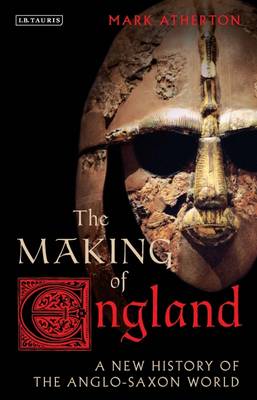‘The Making of England’ by Mark Atherton
Date: 12/04/2017

Dr Mark Atherton, Senior Lecturer in English Language, has published a new literary history of the Anglo-Saxon world, with I. B. Tauris.
During the tenth century England began to emerge as a distinct country with an identity that was both part of yet separate from ‘Christendom’. The reigns of Athelstan, Edgar and Ethelred witnessed the emergence of many key institutions: the formation of towns on modern street plans; an efficient administration; and a serviceable system of tax. Mark Atherton here shows how the stories, legends, biographies and chronicles of Anglo-Saxon England reflected both this exciting time of innovation as well as the myriad lives, loves and hates of the people who wrote them. He demonstrates, too, that this was a nation coming of age, ahead of its time in its use not of the Book-Latin used elsewhere in Europe, but of a narrative Old English prose devised for law and practical governance of the nation-state, for prayer and preaching, and above all for exploring a rich and daring new literature. This prose was unique, but until now it has been neglected for the poetry. Bringing a volatile age to vivid and muscular life, Atherton argues that it was the vernacular of Alfred the Great, as much as Viking war, that truly forged.
“The language of the Anglo-Saxons, long beloved by a succession of notable poets, has for the rest of us too often been afforded the status of a vulgar tongue. In Mark Atherton it has found a new and exciting champion. Atherton provides a rich geographical context that provides not only a sense of how the Anglo-Saxons thought of their local, closely observed, landscapes but also of how they conceived their place within a largely uncharted and perilous world. Over the whole book looms, rightly, the figure of King Alfred and his court to whom, even when all the legends have been dispelled, is undoubtedly owed the remarkable efflorescence of vernacular writings in later Anglo-Saxon England. Interspersed between chapters, the author has provided what he calls Interludes, texts in Anglo-Saxon, with a translation in English and a short commentary. The selections are deeply illuminating, providing as they do an introduction both to the language and the thought-world of the Anglo-Saxon age, from the time of the migration until the reign of King Edgar and his second coronation at Bath in 973 an occasion which, in Atherton s words, marks the theological and political highpoint of the tenth century. Vulnerable though Edgar s kingdom was yet to prove, when faced with the returning Vikings of the eleventh century, its legacy nonetheless endured. The great corpus of Anglo-Saxon literature compiled during the reign provides an unrivalled testimony to the vitality of vernacular culture before the Conquest. Mark Atherton s illumination of this culture and its roots is both arresting and enlightening. It deserves to attract a wide readership.” Henrietta Leyser, Emeritus Fellow and former Lecturer in Medieval History, St Peter s College, Oxford; author of ‘Beda: A Journey to the Seven Kingdoms at the Time of Bede’ and ‘Medieval Women: A Social History of England 450-1500’.